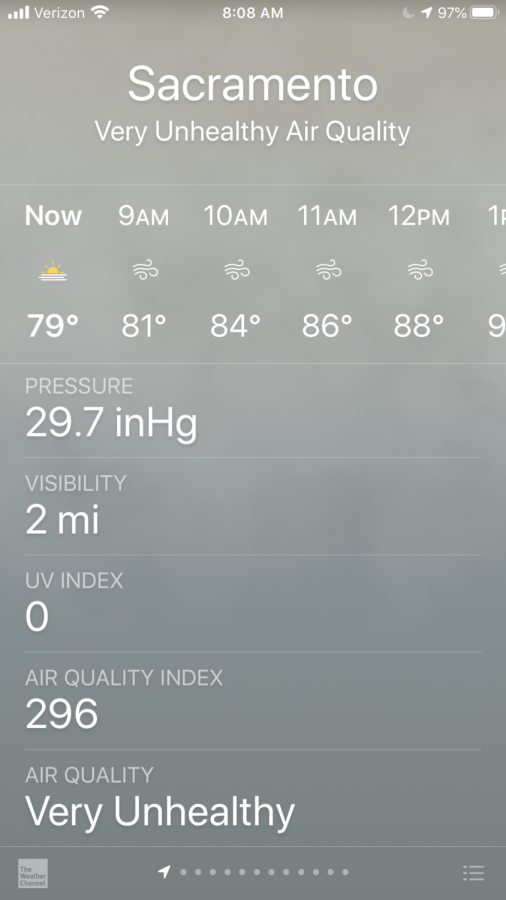District plans to monitor AQI levels as wildfires ravage the state
Poor air quality causes cancellation of the few on-campus operations
According to the Los Rios Community College District, if air quality index (AQI) readings exceed 200, they may again temporarily suspend the few on-campus operations going on this semester. According to the CDC, any AQI readings exceeding 300 are considered hazardous. (Photo courtesy of Rachel Leibrock)
Since August, wildfires around California caused the air quality in Sacramento to increase to unsafe levels. On the morning of Sept. 8, Sacramento’s air quality index (AQI) reached 484, according to the Sacramento Bee.
For context, any air quality levels that reach over 150 are considered to be unhealthy for all groups, and any number over 300 is considered hazardous according to the Center for Disease Control and Prevention (CDC).
The fires have also wreaked havoc around the state as over 3 million acres have burnt in California as of Sept. 14 according to Cal Fire. Along with this, the Creek Fire and North Complex Fire are both under 30% contained and have each burned over 20,000 acres.
The Los Rios Community College District initially responded in August by canceling any on-campus classes that hadn’t already been moved online due to Covid-19. In a news brief posted to the ARC website, the school explained what constitutes classes being cancelled by poor air quality.
“If Air Quality Index (AQI) readings again reach or exceed 200 at locations in our district, we may consider more temporary suspensions of limited on-campus classes and activities,” the statement read.
Since then, no classes have been canceled even though the air quality has been just as bad in the month of September. According to Gabe Ross, LRCCD Associate Vice Chancellor classes have continued through the poor air quality since the August cancellation because of the limited number of people who are on campus this semester.
“Only an extraordinarily small number of students and essential employees are on our physical campuses right now in the first place,” Ross said. “About 15 programs in total at our four colleges are offering in-person classes, and all of them in areas that train first responders or those in areas that have an urgent and significant health and safety impact on our communities.”
Ross said that the campus expects to continue to have problems with smoke in the upcoming years and says the campus will continue to monitor the AQI in those years to monitor student safety.
Though the effects of the smoke may vary for everyone, the CDC suggests to check the AQI anytime you believe it to be smoky and wear the appropriate gear before going out. Though surgical masks do protect you from Covid-19, they do not keep out the smoke.
Depending on your situation, an N95 mask is the safest bet for someone who needs to be outside and safe according to the CDC. If you don’t happen to have this specific mask, the CDC suggests to reduce your outside time to when you absolutely need to.








